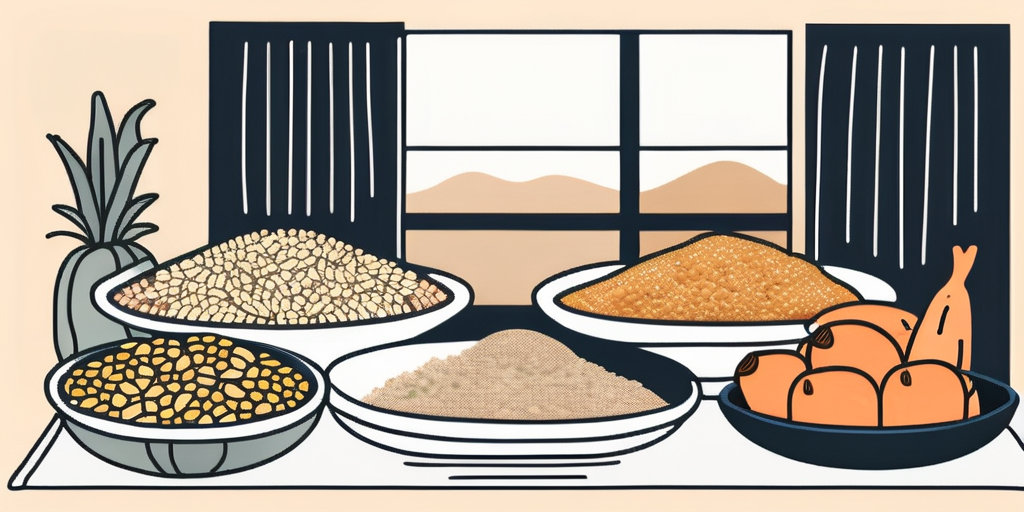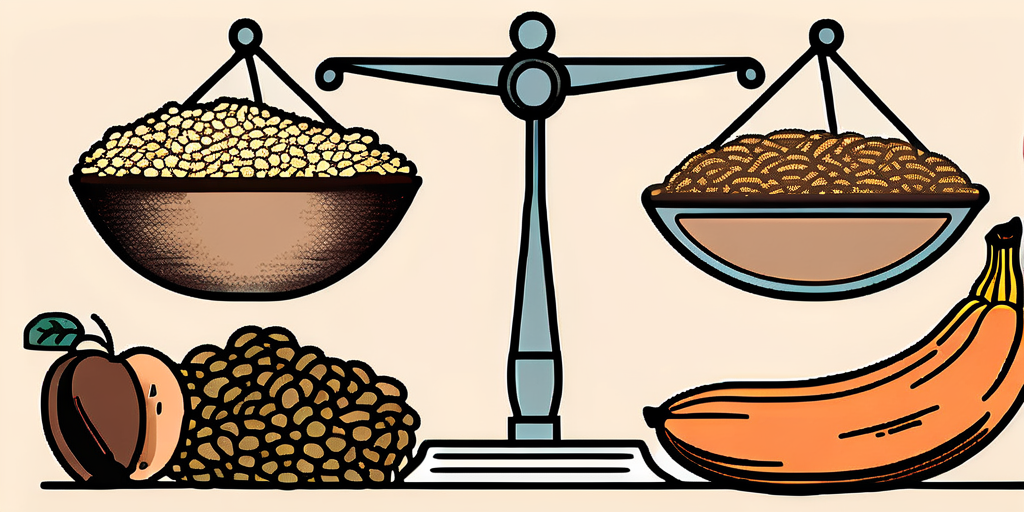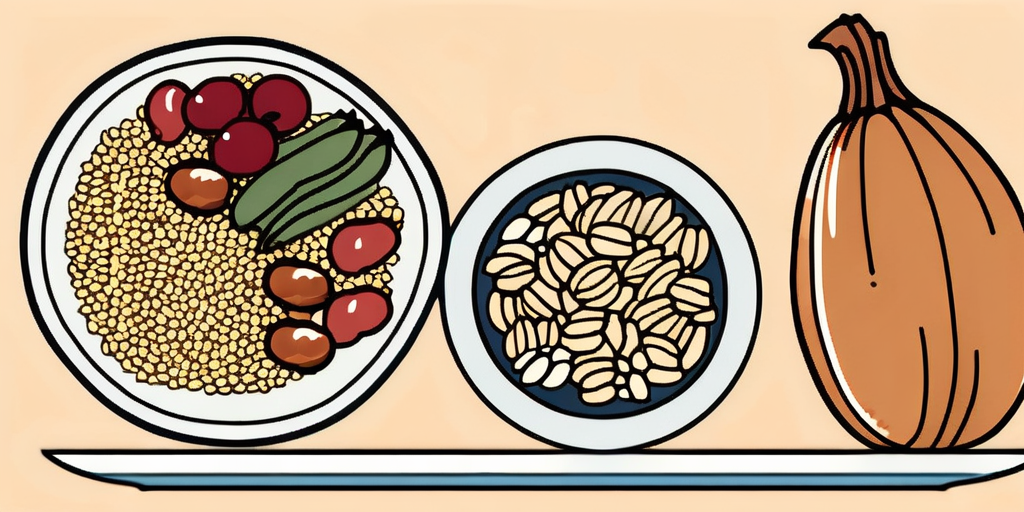Carbohydrates are an essential macronutrient that provides the body with energy. Despite some misconceptions, carbohydrates are an important and necessary component of a balanced diet. In this article, we will explore the role of carbohydrates in our daily nutrition and debunk common myths associated with them. We will also discuss the different types of carbohydrates and their impact on our health. Finally, we will provide a list of the top 10 healthy carbohydrate foods and offer tips on how to incorporate them into our diets.
Understanding Carbohydrates and Their Role in a Balanced Diet
Carbohydrates, along with fats and proteins, are one of the three main macronutrients required by the body. They are a primary source of energy and play a crucial role in fueling our muscles, brain, and other organs. Carbohydrates are broken down into glucose, which is used by our cells for energy production.

Carbohydrates come in different forms, including sugars, starches, and fibers. Sugars are simple carbohydrates that are quickly broken down and absorbed by the body, providing a rapid source of energy. Starches, on the other hand, are complex carbohydrates that take longer to digest and provide a sustained release of energy. Fiber, a type of carbohydrate that cannot be digested by the body, plays a vital role in maintaining a healthy digestive system.
The Importance of Carbohydrates in Daily Nutrition
Carbohydrates are not only a source of energy but also provide essential nutrients and fiber. They are the body's preferred fuel source, especially for intense physical activities. When we engage in activities such as running, cycling, or weightlifting, our muscles rely heavily on carbohydrates to perform optimally. In fact, research has shown that consuming carbohydrates before and during exercise can improve endurance and delay the onset of fatigue.
In addition to providing energy, carbohydrates also contribute to the overall nutritional value of our diet. Many carbohydrate-rich foods, such as fruits, vegetables, whole grains, and legumes, are packed with vitamins, minerals, and antioxidants that are essential for maintaining good health. These foods also provide dietary fiber, which aids in digestion, helps regulate blood sugar levels, and promotes a feeling of fullness.
Debunking Myths About Carbohydrates
There are several myths surrounding carbohydrates that have caused confusion and misinformation. One common myth is that carbohydrates are fattening. While excessive consumption of refined carbohydrates can contribute to weight gain, it is the overall calorie intake that determines weight balance. In fact, a balanced diet that includes appropriate amounts of carbohydrates can actually aid in weight management.
Another myth is that carbohydrates should be completely avoided in order to lose weight. However, the body needs carbohydrates for energy and many important nutrients that are found in carbohydrate-rich foods. It is the type and quantity of carbohydrates, not their exclusion, that affects weight and health.
Choosing the right types of carbohydrates is key to maintaining a healthy diet. Instead of relying on processed and refined carbohydrates like white bread, sugary snacks, and sugary drinks, it is recommended to opt for whole grain products, fruits, vegetables, and legumes. These foods provide a steady release of energy, are rich in nutrients, and contribute to overall health and well-being.
The Different Types of Carbohydrates
Carbohydrates are an essential macronutrient that provides the body with energy. They can be classified into two main types: simple carbohydrates and complex carbohydrates.
Simple carbohydrates, also known as sugars, are composed of one or two sugar molecules. They are quickly digested and absorbed, causing a rapid increase in blood sugar levels. Examples of simple carbohydrates include table sugar, honey, and fruit juices.
Complex carbohydrates, on the other hand, consist of long chains of sugar molecules and take longer to break down in the body. They provide a steady release of energy and are found in foods like whole grains, legumes, and vegetables. Complex carbohydrates also contain essential vitamins, minerals, and fiber, making them a healthier choice compared to simple carbohydrates.
Simple Carbohydrates vs Complex Carbohydrates
When it comes to choosing between simple and complex carbohydrates, it is important to consider their impact on blood sugar levels and overall health.
Simple carbohydrates, due to their quick digestion and absorption, can cause a rapid spike in blood sugar levels. This sudden increase in blood sugar can lead to energy crashes and cravings for more sugary foods. On the other hand, complex carbohydrates provide a more sustained release of energy, preventing sudden blood sugar spikes and crashes.
In addition to their impact on blood sugar levels, simple carbohydrates often lack essential nutrients and fiber found in complex carbohydrates. The fiber content in complex carbohydrates helps regulate digestion, promote satiety, and support a healthy gut. Therefore, opting for complex carbohydrates can contribute to a well-rounded and balanced diet.
The Glycemic Index and Its Significance
The glycemic index (GI) is a ranking system that measures how quickly a carbohydrate-containing food raises blood glucose levels compared to pure glucose. It is a useful tool for individuals who need to manage their blood sugar levels, such as those with diabetes.
Foods with a high glycemic index, such as white bread and sugary snacks, are quickly digested and absorbed, causing a rapid increase in blood sugar levels. This can lead to a temporary energy boost followed by a crash. On the other hand, foods with a low glycemic index, like whole grains and vegetables, are digested and absorbed more slowly, resulting in a slower and more gradual increase in blood sugar levels.
Choosing foods with a lower glycemic index can help maintain stable blood sugar levels, provide sustained energy, and promote overall health. However, it is important to note that the glycemic index should not be the sole factor in determining the healthfulness of a carbohydrate food. Other factors, such as fiber content and nutrient density, should also be considered.
In conclusion, understanding the different types of carbohydrates and their impact on blood sugar levels can help individuals make informed choices about their diet. Opting for complex carbohydrates and foods with a lower glycemic index can contribute to stable blood sugar levels, sustained energy, and overall health.
The Top 10 Healthy Carbohydrate Foods
Now, let's explore the top 10 healthy carbohydrate foods that should be included in a balanced diet:

1. Whole Grains: A Rich Source of Complex Carbohydrates
Whole grains, such as oats, quinoa, and brown rice, are an excellent source of complex carbohydrates. They are also high in fiber, vitamins, and minerals. Including whole grains in your diet can help regulate blood sugar levels, improve digestion, and reduce the risk of chronic diseases.
When it comes to oats, they are not only versatile but also provide a great source of soluble fiber, which can help lower cholesterol levels. Quinoa, on the other hand, is a complete protein, meaning it contains all nine essential amino acids. Brown rice is a whole grain that retains its bran and germ, making it a more nutritious choice than white rice.
2. Fruits: Nature's Sweet Treat
Fruits not only provide natural sugars but are also packed with vitamins, minerals, and antioxidants. They are an excellent source of healthy carbohydrates and fiber. Enjoy a variety of fresh fruits to satisfy your sweet tooth and boost your nutrient intake.
From the juicy sweetness of strawberries to the tropical delight of mangoes, fruits offer a wide range of flavors and textures. They are also rich in phytochemicals, which are natural compounds that have been shown to have numerous health benefits, including reducing the risk of chronic diseases like heart disease and certain types of cancer.
3. Legumes: A Protein and Fiber Powerhouse
Legumes, including lentils, chickpeas, and black beans, are not only rich in protein but also contain a good amount of complex carbohydrates and fiber. They are a great addition to any diet, especially for vegetarians and vegans looking to increase their protein intake.
Lentils, for example, are not only a great source of carbohydrates but also provide a significant amount of iron, which is essential for transporting oxygen throughout the body. Chickpeas, commonly used in hummus and falafel, are not only versatile but also rich in folate, a B-vitamin that plays a crucial role in cell growth and development. Black beans, a staple in many Latin American dishes, are not only packed with fiber but also provide a good amount of potassium, which is important for maintaining healthy blood pressure levels.
4. Root Vegetables: Nutrient-Dense and Satisfying
Root vegetables, such as sweet potatoes, carrots, and beets, are not only delicious but also provide a healthy dose of complex carbohydrates. They are rich in vitamins, minerals, and antioxidants, making them a nutritious addition to any meal.
Sweet potatoes, known for their vibrant orange color, are not only a great source of carbohydrates but also provide a good amount of vitamin A, which is important for healthy vision and a strong immune system. Carrots, with their crunchy texture, are not only rich in beta-carotene, a powerful antioxidant, but also provide a good amount of vitamin K, which is essential for blood clotting. Beets, known for their deep red color, are not only a great source of carbohydrates but also provide a good amount of folate and manganese, which are important for cell growth and metabolism.
5. Dairy: A Source of Carbohydrates and Protein
Dairy products, like milk and yogurt, contain natural sugars in the form of lactose. They also provide protein, calcium, and other essential nutrients. Opt for low-fat or skim versions to keep the calorie content in check.
Milk, a staple in many households, is not only a good source of carbohydrates but also provides a significant amount of calcium, which is important for healthy bones and teeth. Yogurt, whether enjoyed plain or flavored, is not only a great source of carbohydrates but also provides probiotics, which are beneficial bacteria that can help support a healthy gut.
When choosing dairy products, it's important to opt for low-fat or skim versions to reduce the intake of saturated fats, which can increase the risk of heart disease. Additionally, for those who are lactose intolerant or prefer non-dairy alternatives, there are plenty of plant-based options available, such as almond milk and soy yogurt.
Incorporating Healthy Carbohydrates into Your Diet
Now that we know the importance of healthy carbohydrates in our diet and have identified some of the best sources of carbs, let's discuss how to incorporate them into our daily meals.

When it comes to incorporating healthy carbohydrates into your diet, meal planning is key. By striving for a well-balanced plate that includes a variety of healthy carbohydrates, protein, and veggies, you can ensure that you are getting all the necessary nutrients for optimal health.
Start by choosing whole grains as the base of your meals. Whole grains, such as quinoa, brown rice, and whole wheat bread, are rich in fiber and provide a steady release of energy throughout the day. Pair them with lean proteins, such as grilled chicken or fish, to create a satisfying and nutritious meal. Add a generous serving of vegetables to complete your plate and boost the nutritional value of your meal.
Don't be afraid to experiment with different recipes and cuisines to keep your meals exciting and enjoyable. Incorporate legumes, such as lentils or chickpeas, into stews and salads for added protein and fiber. Roast root vegetables, like sweet potatoes or beets, for a tasty and nutritious side dish. And for a refreshing and healthy dessert option, indulge in a fruit salad filled with a variety of colorful fruits.
Snacking smartly is another way to incorporate healthy carbohydrates into your diet. Opt for snacks that combine carbohydrates with protein, as this combination provides sustained energy and keeps you feeling full between meals. For example, enjoy apple slices with almond butter or whole grain crackers with hummus. These snacks not only taste delicious but also provide a good balance of nutrients.
Remember, balance and moderation are key when it comes to carbohydrates. Choose whole, unprocessed foods whenever possible and pay attention to portion sizes. By incorporating these tips and the top 10 healthy carbohydrate foods into your diet, you can confidently include carbohydrates in your meals for optimal health and well-being.




